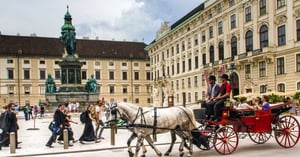In today's rapidly evolving urban landscapes, cities around the world are endeavouring to integrate technology and innovation to enhance the quality of life for their inhabitants. Vienna, a city known for its rich history, architectural marvels, and cultural vibrancy, has been at the forefront of the smart city movement, using digital transformation as a catalyst to address urban challenges.
In our recent discussion with Franz Xaver Pfaffenbichler, a key figure in Vienna's eGovernment and Smart City initiatives, we delved into the nuances of Vienna's approach towards becoming a Smart and Sustainable City and the multifaceted strategies being employed to ensure a harmonious fusion of technology, society, and environment.
A Fireside Chat with Smart City Vienna
Can you introduce yourself and tell me about your role?
My name is Franz Xaver Pfaffenbichler, I’ve been working for the City of Vienna for almost ten years. Starting in the area of trust and identity, I soon moved on to the topics of eGovernment and Smart City, which I am currently mainly involved in. As the City of Vienna, we are part of many international networks promoting open and standardized solutions, such as FIWARE, OASC, Gaia-X and more.
As all cities are unique, what are the main challenges that Vienna is facing?
The challenges that cities face are largely similar (climate crisis, digitalization, urbanization, globalization, demographic change); what matters is how to respond to these challenges.
Vienna's response is the Smart Climate City Strategy Vienna. The Smart City Vienna Framework has been in place since 2011 and is a living document. The long target horizon requires regular adjustments - regarding:
- On the one hand, international requirements and obligations.
- On the other hand, local and municipal policy goals.
Since the last update of our Smart City Framework, time has not stood still and, unfortunately, neither has climate change and its increasingly visible consequences.
That is why the city government has set itself the ambitious but necessary goal of climate neutrality by 2040 in its government program. And that is why, so soon after the last decision, we are working again to adapt our strategy to the necessary framework conditions.
We focus on people, so we created the Viennese manifesto on digital humanism back in 2019.
We are also addressing the issues through international collaborations, we are a member of, for example, of the FIWARE Foundation, OASC, the Digital Rights Coalition, and more, and also at a more local level with the city and its partners, such as in DigitalCity.Wien or Vienna 2030 Economic Council.
Why is digital transformation so important for Vienna?
In the next few years, we want to make Vienna the digitization capital of Europe. Through smart measures, we are creating great progress in the digital sector and for the city's residents. After all, the ultimate goal of Vienna's digitization strategy is to improve the common good and people's lives - because in Vienna, the motto is always: "People in the foreground".
The Smart City Vienna mission remains the same: “High quality of life for everyone in Vienna through social and technical innovation in all areas, while maximising conservation of resources.”
The digital agenda (entitled "livable Vienna") defines binding goals for the city, that were developed in a citizen participation process, through which the implementation of appropriate measures will be fulfilled. The goals are personalized services, a smart city through data, a future-proof infrastructure (especially also in the education sector), and digital health and care for better transparency and reduction of waiting times.
An important point here is also the sustainable use of infrastructures (circular economy).
What are the business and social benefits of your digital transformation strategy?
In its Smart Climate City Strategy, Vienna is committed to a social, human approach. “Smart” solutions are not an end in themselves but must always focus on people and their quality of life. “Smart City Vienna” is the vision of a city in which life is good without being so at the expense of the environment and future generations. Vienna uses the opportunities that social innovations and new technologies bring with them actively and prudently to achieve the goals. That benefits all areas, citizen, business, and research, through cooperation, collaboration and shared skills.
Does the size of the city present a challenge for the implementation of certain smart city activities? Or does it make it easier? Does the size of the economy help or hinder the deployment of solutions?
Vienna is a growing city that will soon reach 2 million inhabitants. On the one hand, the size helps, since Vienna combines both city and state administration, we can offer well thought-out solutions. On the other hand, in an organization with about 67,000 employees, it naturally takes a little longer. But here, the centralization of the IT department, automation and the establishment of internal roles in the departments such as digital officers or data stewards help us to promote the digitalization potential in the many different areas of the city.
What is the best example of a use case in Vienna?
We work on so many fronts, it's impossible to choose just one.
A good example is MeinWien (My Vienna), a citizen platform where we want to affirm the keyword "personal government". In your own personal platform, you can submit applications to the City of Vienna, track their status and always stay up to date. Whether it's applying for a market stall (with BRISE) or reporting a broken traffic light (with Sag’s Wien). Combined with other city services, such as the WienBot, an AI-supported chatbot, the platform offers your own personal internet portal for all your concerns with the city.
Another big project that depends very much on collaboration, both within the city and internationally in relation to other cities, is the FIWARE-based IoT data platform, the 3D city map and the beginnings of a digital twin.
I would also like to mention a project that offers direct support from the City of Vienna, the cybercrime helpline, which is available free of charge, confidential and anonymous, for cases of online fraud, phishing and similar cases.
Outside of data and digitalization, which smart city pillars are the most important for Vienna?
Digitization is not merely a goal in itself. In the spirit of "digital humanism," the city keeps the rights and needs of all people in Vienna in mind in all its efforts. It uses new technologies for an inclusive urban society, for equal opportunities and barrier-free participation of all population groups. Digitization should make life easier, create jobs and make Vienna even fairer.
Therefore, it is quality of life that we focus on. Quality of life is not a matter of luck, but the sum of a variety of factors. The City of Vienna is working hard to further maintain the highest quality of life.
What are your predictions for the future of Vienna, and for smart cities in general?
There will have to be more focus in different areas, such as:
- Investing in digital skills (data literacy, within the city administration and throughout the whole of Vienna like for example in schools).
- More provisioning of open data, continuing the data excellence strategy of Vienna.
- The promotion of IT-talents and further education of skilled professionals.
And what are the biggest obstacles for Vienna in achieving those goals?
We need to take a differentiated approach to our tasks and strengthen digital sovereignty. People have different skill sets, and a “one size fits all“ style is outdated.
A major issue is trust in the digital space, be it in relation to organizations or unknown technologies. This is where campaigns are needed to strengthen data literacy.
So what did we learn about Smart City Vienna?
Vienna's journey towards digital transformation is a testament to the city's dedication to ensuring a high quality of life for its residents. Through our conversation with Mr. Pfaffenbichler, it becomes evident that the city's focus isn't just on digital prowess, but on creating a holistic environment where technology serves the greater good.
The importance of collaboration, both locally and internationally, the emphasis on a citizen-centric approach, and the underlying commitment to environmental and social welfare set Vienna apart as a model smart city. As urban centres around the world grapple with the challenges of the 21st century, Vienna's strategies offer insightful lessons on harmonizing technology with human and environmental needs.
CITIES AROUND THE WORLD ARE LOOKING FOR SOLUTION PROVIDERS FOR THEIR SMART CITY PROJECTS
If you are one of them, take a look at our Tender Premium Service and you will never miss a suitable tender again with our smart alert.


